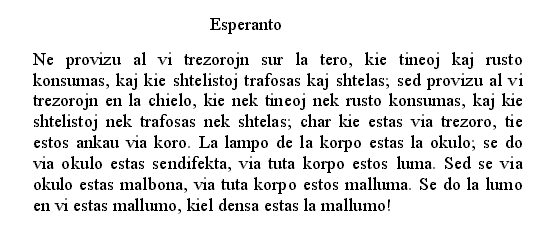
Worldwide shipping, since 1992!
View Cart
| About Us | Contact Us |
 |
Hundreds of Languages, Thousands of Products Worldwide shipping, since 1992! |
View Cart |
|
|
|||
| Languages | > | Esperanto | Tweet |
Esperanto, the most important and influential of the so-called artificial languages, was devised in 1887 by Dr. Lazarus Ludwig Zamenhof of Warsaw, Poland. Based on the elements of the foremost Western languages, Esperanto is incomparably easier to master than any national tongue, for its grammar rules are completely consistent, and a relatively small number of basic roots can be expanded into an extensive vocabulary by means of numerous prefixes, suffixes, and infixes. The French Academy of Sciences has called Esperanto "a masterpiece of logic and simplicity." Language Family

Lay not up for yourselves treasures upon earth, where moth and rust doth corrupt, and where thieves break through and steal; but lay up for yourselves treasures in heaven, where neither moth nor rust doth corrupt, and where thieves do not break through nor steal; for where your treasure is, there will your heart be also. Thc light of the body is the eye; if therefore thine eye be single, thy whole body shall be full of light. But if thine eye be evil, thy whole body shall be full of darkness. If therefore the light that is in thee be darkness, how great is the darkness! | |||||||
|
©1992-2025 World Language Resources, Inc.
All Rights Reserved.
2390 Crenshaw Blvd., #813, Torrance, CA 90501 USA Tel: 424-328-0063 About Us | Contact Us | Privacy Policy | Help Browse: Languages | Product Types | Countries |